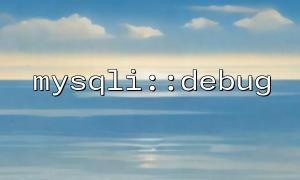When developing PHP applications, the lightweight ORM (Object Relational Mapping) framework is often used to simplify the conversion between database operations and objects. When we are processing database records, we often need to get the last record of a certain data set. In PHP, you can use the end() function to achieve this requirement. This article will introduce how to use the end() function to get the last record when building a lightweight ORM.
end() is an array function in PHP. It returns the last element in the array and points the inner pointer of the array to that element. In this way, we can quickly access the last item of the array without traversing the entire array.
mixed end ( array &$array )
Parameter description:
array : The array to be operated, the reference is passed in.
Return value: Returns the last element of the array. If the array is empty, FALSE is returned.
In the ORM framework, we usually get a result set (i.e., an array containing multiple records) from the database. Assuming that we have already queryed a set of results and want to get the last record in this set of results, the end() function can come in handy.
Suppose we have a database table users and we want to get the last record in that table:
<?php
// Simulate database query results,Returns an array containing multiple user records
$users = [
['id' => 1, 'name' => 'Alice', 'email' => 'alice@m66.net'],
['id' => 2, 'name' => 'Bob', 'email' => 'bob@m66.net'],
['id' => 3, 'name' => 'Charlie', 'email' => 'charlie@m66.net'],
];
// use end() Get the last record in the array
$lastUser = end($users);
// Output the last record
if ($lastUser) {
echo "Last record:\n";
echo "ID: " . $lastUser['id'] . "\n";
echo "Name: " . $lastUser['name'] . "\n";
echo "Mail: " . $lastUser['email'] . "\n";
} else {
echo "No record。\n";
}
?>
Suppose the $users array is the result set obtained from the database query and contains multiple user records.
We use end($users) to get the last record in the array $users .
The end() function returns the last element in the array and moves the array pointer to the last item. If the array is empty, FALSE is returned.
Finally, we output the last record we obtained.
Last record:
ID: 3
Name: Charlie
Mail: charlie@m66.net
Effects of array pointers :
end() will modify the internal pointer of the array, so after calling end() , if you continue to access other elements of the array, you may start with the last element. If you do not want to affect the pointer, you can use reset() to reset the pointer to the beginning of the array before using end() .
Processing of empty arrays :
When using end() , if the array is empty, the return value is FALSE , so appropriate checks are required when using it.
Applicable to associative arrays :
When building an ORM, data is usually returned as an associative array, and end() also applies to such structures. Just make sure that the data is correctly stored as an array before end() is called.
By using PHP's end() function, we can easily get the last record of the result set when building a lightweight ORM. This method does not require looping through the array, and is highly efficient, and is especially suitable for scenarios where you need to quickly access the last item of data. However, you need to pay attention to the changes in array pointers and the special handling of empty arrays.
Hopefully this article helps you get the last record more efficiently when building PHP ORM. If you have any questions or further questions, please leave a message to discuss!















